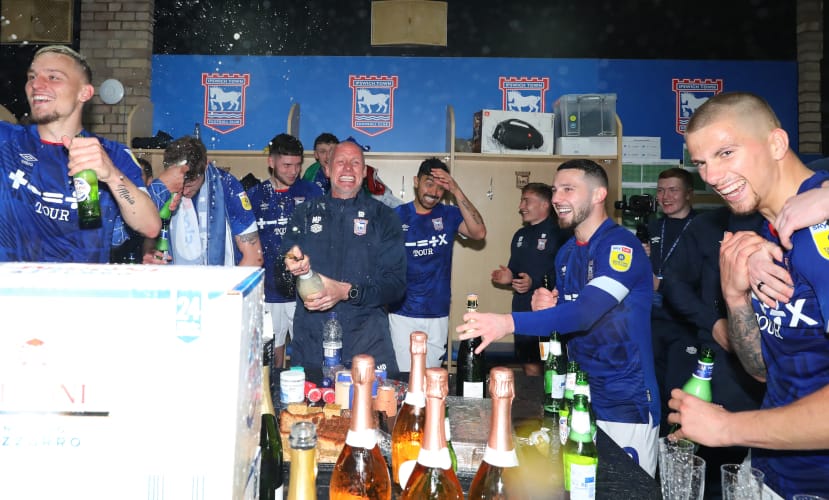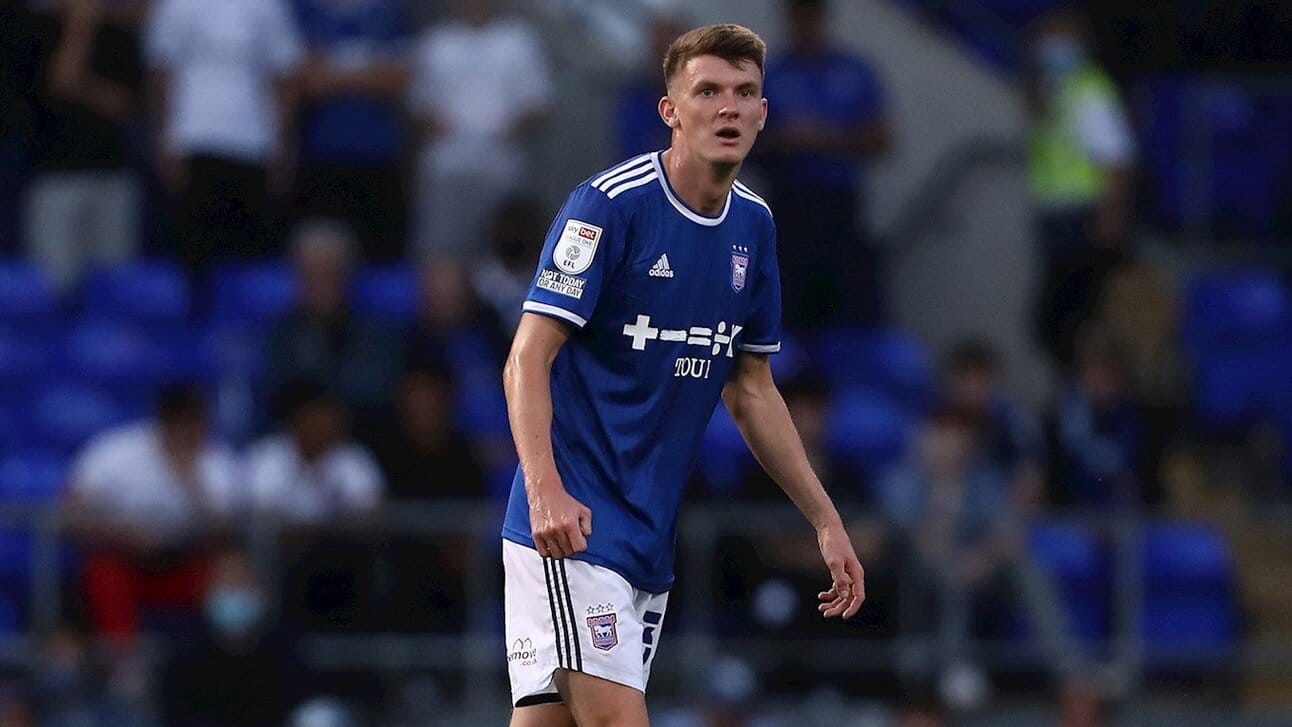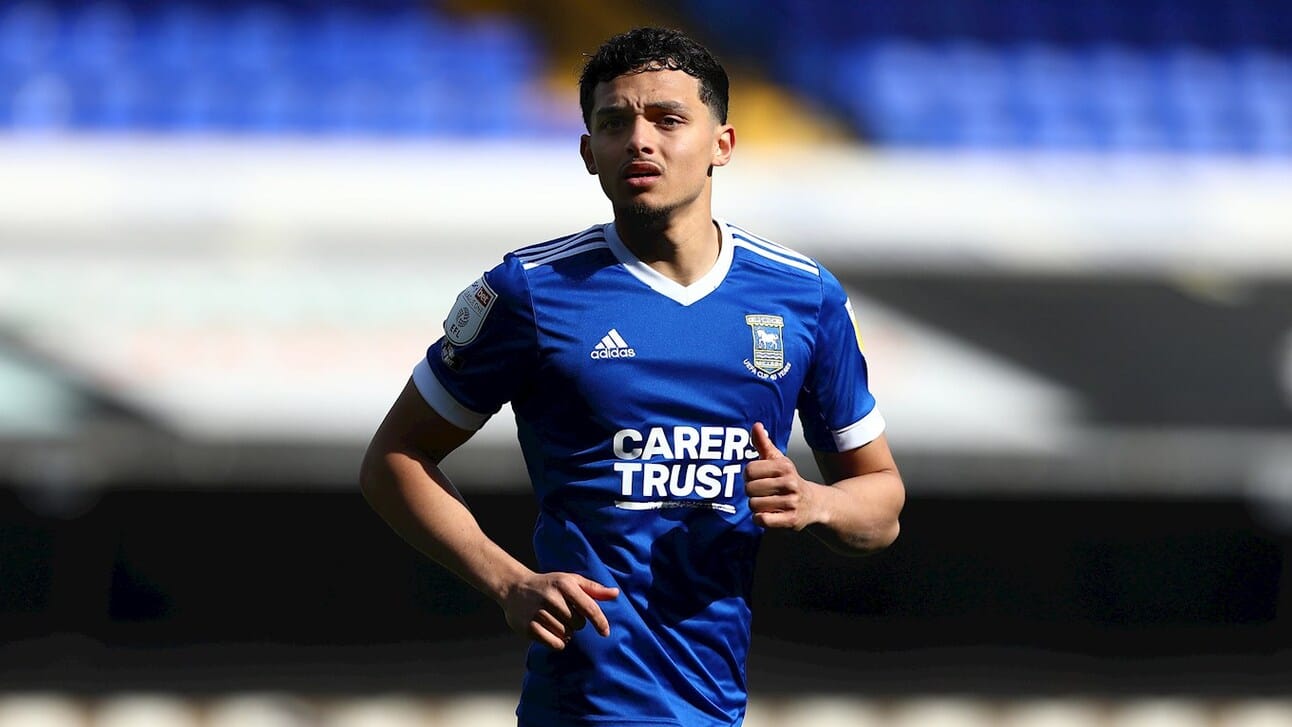- Blue and White Notes
- Posts
- Some of Our Own
Some of Our Own
Do we make scapegoats of local lads?
One of the (many) joyful things when we finally clinched promotion against Exeter last season was watching the two Ipswich boys, Luke Woolfenden and Harry Clarke, taking in the celebrations post-match. Harry Clarke was first out of the dressing room after the pitch cleared, stealing a massive flag from Bluey and milking the applause and the singing. Clarke cut an iconic figure. When you resemble a Classical Greek statue come to life getting a big flag makes you look like you are about to go fight the Persians at Thermopylae. When Clarke and Woolfenden led some (probably ill-advised) songs about Norwich in front of the Sir Bobby Robson Stand, it felt like they more than anyone understood what this modest bit of redemption meant for us. They both knew how awful it had been and for how long, how good it was to have heroes again.

It is comparatively rare to have Ipswich-born players as regulars. Ipswich always felt like a club built on its academy, but a lot of the players we produced weren’t from the town. An Ipswich-born Ipswich XI includes a fair bit of filler and only two Ipswich-born players have ever played for England and played for us, Richard Wright and Kieron Dyer. Once you get past former England U21s Jason Dozzell and Titus Bramble, Clarke and Woolfenden are both probably a good shout for a greatest ever Ipswichian team, as is Chantry’s Macauley Bonne and Jason’s much-maligned son. We’re actually in somewhat of a golden age for locals, even if the lack of academy breakthroughs over the past two seasons sometimes makes it feel otherwise.
When the occasional Ipswichian does sneak into the first eleven, the conventional wisdom is that local boys get an easy ride from the fanbase. We all love to see “one of our own” wearing the Blue and White, so they supposedly get a bit more leeway to make mistakes. I suspect though, as is often the case with conventional wisdom, the opposite is actually true. That in fact, we’re often on a hair trigger with the young men living our dream.
In the dark days of Marcus Evans it was often relatively easy for academy players to get a shot at first team football. We were rarely very good for very long, so a promising youngster could often work themselves to the front of the queue, often well before they should have been able to. Players doing well in the U23s were at the front of critical supporters’ minds, as a solution to the latest crisis, as the key to fixing whatever currently ailed us. Promising teenagers, like the long term injured, get better and better in our minds the worse the first team gets and the longer they don’t play.

Once they got that opportunity, however, it always felt like grace periods were incredibly brief. A teenager with half an EFL Trophy appearance was a potential world beater, a 22-year-old with 100 league appearances was “only in the team because he’s [sarcastically] one of our own”.
Luke Woolfenden’s first team trajectory took him from the solution to all our problems to lightweight liability in a blink of an eye. He gained a reputation for being too flimsy in an aerial duel and too laid back in general, that in some quarters still follows him even now. Not much allowance was given for youth, nor much appreciation for the physical transformation from brittle to brick outhouse he underwent roughly two seasons ago. He wasn’t the only local boy who got scant sympathy for patches of bad form. Macauley Bonne’s Ipswich career ended badly, but the horror that greeted the prospect of re-signing him in Summer 2022 was well beyond what you expect for a player who made a goal contribution once every 187 minutes.
Andre Dozzell, as the son of a much better Ipswichian Ipswich Town footballer, perhaps exemplifies the cliff edge that confronts young players with local connections. As an academy player he was the future of the club, as an injured teenager he was everything we needed, as a regular in the first team he was vilified out of all proportion to his actual deficiencies. In the dire season that was 2021-22 Dozzell was probably the best of a bad bunch. He played most weeks in a midfield consisting of just him and poor, fragile, Teddy Bishop, who had barely made a tackle since injury robbed him of most of his athleticism. He racked up respectable defensive numbers for a team that was stingy at the back (if little else), whilst also leading us for chance creation. I maintain that if Dozzell had been an outsider then his 43 appearances would have ranked above James Wilson’s 17 in the Player of the Season stakes. Yet the reaction to his sale to QPR was almost celebratory.

Perhaps local connections make every reaction more extreme. When things go right, like that day against Exeter last May or like when Bonne was scoring for fun, it’s more intense. There’s an atmosphere of mutual love between player and supporters that fills the air, then builds and builds. When things go wrong, when that bubble pops, when the local boy can’t conquer all, you can’t just treat them like any other player and the air gets that bit more rancid. There seems to be an unwelcome readiness to declare any flaws a betrayal of the bond between Ipswich fans and Ipswich boy.
I worry that right now that bad air might be coming for Harry Clarke. He’s been in and out of the team since Brandon Williams got up to speed (no shame in that), he’s had a pre-season injury and a few difficult afternoons (Leeds at home particularly). He was the big new hero last season and got all the adoration. It’s a heck of a lot of pressure to live and work so publicly in the community you grew up in and you can see that Harry pours a huge amount of emotion into his football. There were tears after promotion, there was a huge roar of feeling after his goal against Blackburn. There’s also the palpable awkwardness when Clarke does his customary fist pump after an afternoon as an unused substitute.
Of late there’s been some out-of-proportion criticism, which is the absolute last thing we need. We want the stakes reduced for Harry Clarke right now, the emotional weight of being the hometown hero lessened. He found Fulham in the EFL Cup difficult, but so did everyone. He was as steady as anyone was in the first half of Saturday’s draw with Birmingham City and made some excellent contributions to our rally in the second half. He has some positional awareness kinks to iron out, but the team’s shape also seems to allow him to be isolated by opposition wingers too often. These are things to work on but they aren’t unsolvable and he has some wonderful attributes as a young footballer. Not just the obvious pace and power, but a lovely ability to drop his shoulder and zip inside his marker, not to mention the potential thunderbastard in that right foot. The dip past Siriki Dembele and cultured pass out to Dane Scarlett for our first goal yesterday show cased some of his qualities.
Ideally, it’s time to reverse a toxic tradition of getting restive with the local lads. He doesn’t need to be the all-conquering Ipswichian right this moment, just another relatively young player learning his trade. At 22, Luke Woolfenden was still trying and failing to form an impenetrable backline with baby Mark McGuinness. Treat him like any other footballer at the club, keep that expectation off him and give him as much patience as we can. They more we give him, the more chance he will flourish. Let Harry breathe.
Harry Clarke v Birmingham City
Minutes played 90
Accurate passes 50/64 (78%)
Chances created 1
Expected assists 0.15
Touches 101
Successful dribbles 0/1 (0%)
Passes into final third 11
Accurate crosses 1/4 (25%)
Accurate long balls 6/9 (67%)
Dispossessed 1
Tackles won 2/3 (67%)
Blocks 1
Interceptions 2
Recoveries 7
Ground duels won 3/6 (50%)
Aerial duels won 6/8 (75%)
Fouls 1
Reply